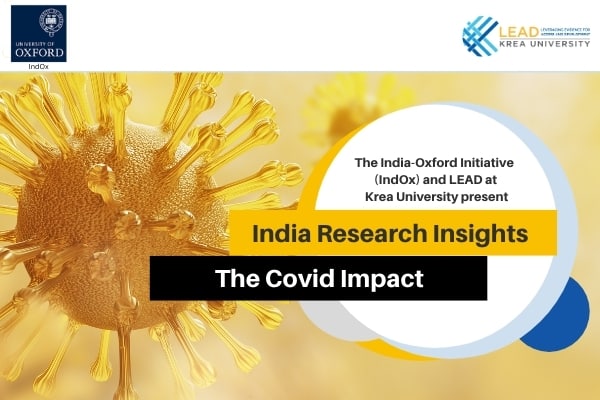The India-Oxford Initiative (IndOx) at University of Oxford under its collaboration with Krea University and in partnership with LEAD at Krea hosted ‘India Research Insights : The Covid Impact’, an insights roundtable which profiled powerful research outcomes from various Indian research agencies who have been tracking the Covid Impact on Mental Health, Migration, Gender, and Digital Media Consumption. This was an inaugural public event under the collaboration, the first of its kind for IndOx in India.
Dr Bishnu Mohapatra from the Undergraduate School at Krea University welcomed the audience to the inaugural collaborative event, “The study of any conjecture not merely 2020 conjecture-the COVID conjecture, cannot be a singular affair, it has to be a collaborative affair. We are delighted that at this point, Krea and IndOx are coming together to reflect on this conjecture. “
Dr Faisal Devji, Co-Chair of IndOx added, “The India-Oxford Initiative was meant to allow all of us who work on ‘India’ to come together, whether it is people in the natural sciences, social sciences, medical sciences or humanities. And for the first time in Oxford’s history, we are able to communicate in an institutionalised regular way, act together and present a single face. One of the things we are interested in is engaging with India, Indian institutions, Indian students, Indian academics and Indian society. Our agreement with Krea is meant to do precisely that.”
The impact session included 15-minute capsules of four knowledge paper presentations presented by senior research heads from leading agencies, followed by a response session exploring these diverse narratives.
The leading presentation by Comscore represented the research study- Impact of Covid 19 on Digital Media Consumption in India. Presented by Neha Singh, Director, Client Insights at Comscore India, the study explored how 2020 has been a year like no other as India saw a complete lockdown for more than 2 months and then revived its daily activities amid the threat of the pandemic. Through some numbers and the insights behind them, the knowledge paper examined how the change in our lives and priorities reflected in the digital media consumption and what this change means for consumers and businesses.
Packed with insights from the forefront, India Migration Now (IMN) followed with the knowledge paper-Migrants During COVID-19: IMN Initiatives. Presented by Priyansha Singh, Policy & Communications Lead at IMN, the study showcased insights from IMN responding to the migrant crisis, through multiple avenues, including coordinating relief activities, collating SOS lists, pursuing media advocacy strategies, engaging with stakeholders, and conducting surveys and qualitative research into the conditions of migrants everywhere.
Dr Sona Nair, Principal Economist at IWWAGE presented the research study – Impact of COVID on Women Labour in Informal Sector. The presentation focussed on the challenges faced by women migrant workers in construction, factories and petty service segments as well as those faced by women’s small and informal enterprises. It highlighted women’s resilience and role in community leadership to prevent the pandemic through the SHGs.
The concluding knowledge paper presentation was on the impact on Mental Health by LEAD at Krea University. Titled ‘The Covid-19 pandemic and impact on mental health services: The provider perspective ‘, the study was done in collaboration with Schizophrenia Research Foundation (SCARF) India for the India-Oxford Initiative (IndOx), and was presented by Sapna Nair, Research Fellow and co-presented by Preethi K, Kaustav Mehta and Ananya Raju, the latter two being sophomores at Krea University. The research study explored how mental health issues in the aftermath of the Covid-19 have been an area of increasing concern for public health, second only to the containment of the pandemic itself.
The study establishes a need to explore the impact on the consequences of the pandemic across the spectrum of care services. Particularly, from a service provider perspective on challenges faced through the pandemic by the response systems the resilience of the response systems in responding to the care of the severely mentally ill.
The final piece of the evening was an overview of student well being initiatives at Krea University, bothon campus and offline, including conception, design and pilot launch of Peer-to-Peer counselling programme. Samuel Prithiv, representing the Office of Student Life co-presented with Satvika Char another sophomore at Krea, shedding light on the University’s resolute commitment to student well-being.
Dr Premila Webster, Senior Research Fellow from Oxford India Sustainable Centre, concluded the event with parting thoughts, “We didn’t want to have research as is done a lot of the time for the sake of research, sitting in ivory towers. We wanted research that was embedded and useful to people we were helping and working with. We are working with a great group of people and this should be the foundation of work we do. Hopefully this will be the beginning of a wonderful and long collaboration.”
The public workshop was open for all and was followed by a Q&A session.
